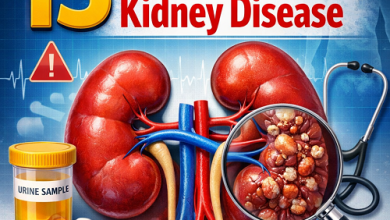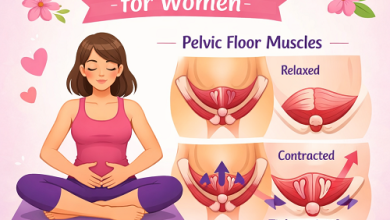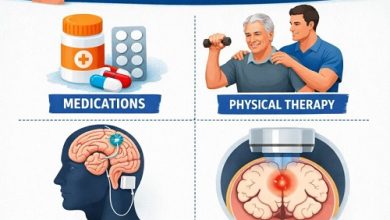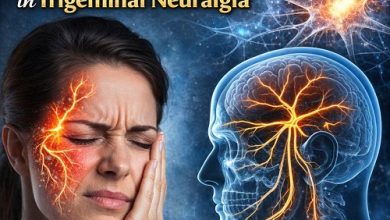What Are the Signs of Perimenopause in Your 40s?

For many women, their 40s represent a dynamic stage of life filled with both personal and professional responsibilities. In this busy time, subtle and sometimes confusing changes in the body often begin to appear. These changes may signal the start of perimenopause—the transitional phase leading up to menopause.
Understanding perimenopause is essential, not only to ease anxiety about unexpected symptoms but also to take proactive steps toward managing health and well-being. what perimenopause is, why it happens, and the common signs women experience in their 40s. We’ll also discuss when to seek medical advice, lifestyle adjustments, and strategies for navigating this important life stage with confidence.
What Is Perimenopause?
Perimenopause, sometimes called the menopausal transition, is the time leading up to menopause when a woman’s ovaries gradually produce less estrogen and progesterone. It typically begins in the mid-to-late 40s, though for some women it can start as early as the mid-30s or as late as the early 50s.
This transition can last anywhere from 2 to 10 years. Menopause is officially reached when a woman has gone 12 consecutive months without a menstrual period. The average age of menopause is 51, which means many women spend several years in perimenopause before reaching that milestone.
The fluctuating hormone levels during this time trigger a wide range of symptoms—some physical, some emotional, and some cognitive—that can vary greatly in severity from woman to woman.
Why Hormonal Changes Matter
The primary hormones involved are:
- Estrogen: Helps regulate the menstrual cycle, supports bone health, and influences brain function.
- Progesterone: Balances estrogen, prepares the uterus for pregnancy, and has calming effects on the body.
- Follicle-Stimulating Hormone (FSH): Rises as the ovaries produce fewer eggs, signaling the approaching end of reproductive years.
As these hormones fluctuate unpredictably, the body struggles to maintain balance, leading to the diverse symptoms associated with perimenopause.
Early Signs of Perimenopause in Your 40s
The symptoms of perimenopause often develop gradually. Some women barely notice the changes, while others find them disruptive to daily life. Below are the most common signs to watch for:
1. Menstrual Irregularities
Changes in the menstrual cycle are usually the first sign of perimenopause. You may experience:
- Shorter or longer cycles
- Skipped periods
- Heavier or lighter bleeding
- Spotting between periods
These irregularities occur because ovulation becomes less predictable as estrogen and progesterone levels shift.
2. Hot Flashes and Night Sweats
Sudden sensations of heat, often accompanied by sweating, flushing, and a rapid heartbeat, are classic symptoms. At night, these may manifest as night sweats, which can disrupt sleep. Research shows up to 80% of women experience hot flashes during perimenopause.
3. Sleep Disturbances
Hormonal fluctuations can directly affect sleep patterns. Common issues include:
- Trouble falling asleep
- Waking up frequently at night
- Early morning awakenings
- Poor sleep quality due to night sweats
Chronic sleep disruption can lead to fatigue, irritability, and difficulty concentrating during the day.
4. Mood Changes
Emotional symptoms are another hallmark of perimenopause. These may include:
- Increased irritability
- Anxiety or nervousness
- Depressive feelings
- Mood swings
While hormone shifts play a role, midlife stressors—such as work, family, or aging parents—can amplify emotional changes.
5. Vaginal and Bladder Changes
Declining estrogen levels affect the health of the vaginal and urinary tissues, leading to:
- Vaginal dryness
- Itching or burning
- Painful intercourse
- More frequent urinary tract infections (UTIs)
- Increased urgency or leakage (urinary incontinence)
These symptoms, collectively known as genitourinary syndrome of menopause (GSM), may appear gradually but become more noticeable in the late 40s.
6. Reduced Fertility
Although fertility declines with age, it is still possible to become pregnant during perimenopause if ovulation occurs. Women in their 40s who are not planning pregnancy should still use contraception until menopause is confirmed.
7. Decreased Libido
Hormonal shifts can lower sex drive. This may be due to reduced estrogen, lower testosterone, or the impact of vaginal dryness and discomfort. Emotional stress and fatigue can further contribute to a decline in sexual desire.
8. Weight Gain and Body Composition Changes
Many women notice changes in weight distribution during perimenopause, particularly increased belly fat. Slower metabolism, reduced muscle mass, and hormonal changes all contribute. Maintaining a healthy lifestyle becomes even more critical during this time.
9. Cognitive Changes (“Brain Fog”)
Some women report difficulty concentrating, forgetfulness, or a sense of mental “fog.” Estrogen influences brain function, and its fluctuations may temporarily affect memory and processing speed.
- Headaches and Migraines
For women prone to migraines, hormonal changes can make headaches more frequent or severe. Conversely, some may notice improvement as estrogen levels stabilize closer to menopause.
11. Joint Pain and Stiffness
Estrogen has anti-inflammatory properties, so declining levels may lead to increased aches and pains in the joints and muscles.
12. Breast Tenderness
Shifting hormone levels can also cause cyclical breast pain, similar to premenstrual discomfort.
- Skin and Hair Changes
Estrogen supports collagen production and skin elasticity. During pregnancy, women may notice:
- Drier skin
- Thinner hair
- Hair shedding
- Loss of skin plumpness
14. Bone Health Concerns
Although osteoporosis risk rises more significantly after menopause, bone density may begin to decline during perimenopause. This makes calcium, vitamin D, and weight-bearing exercise increasingly important.
15. Irregular Heartbeats (Palpitations)
Some women experience palpitations, which are often linked to hot flashes, anxiety, or hormonal fluctuations. While usually harmless, they should be evaluated if persistent.
Emotional and Social Impact of Perimenopause
Perimenopause isn’t just a physical experience—it also affects emotional and social well-being. In your 40s, life often involves juggling multiple roles: raising teenagers, supporting aging parents, managing a career, and maintaining relationships. Adding perimenopausal symptoms into the mix can feel overwhelming.
Some women feel a sense of loss or sadness about the end of their reproductive years, while others embrace it as a new chapter of freedom. Recognizing that these emotional responses are valid and normal is an important step in coping.
When to Seek Medical Advice
Not all symptoms require medical treatment, but it’s wise to consult a healthcare provider if you experience:
- Very heavy or prolonged bleeding
- Bleeding between periods
- Severe mood changes or depression
- Hot flashes or night sweats interfering with daily life
- Painful sex that doesn’t improve with lubricants
- Frequent UTIs or bladder issues
A doctor can rule out other conditions, such as thyroid disorders or fibroids, that may mimic perimenopausal symptoms.
Managing Perimenopause: Practical Tips
Although perimenopause is a natural stage of life, its symptoms can be challenging. The good news is that many lifestyle strategies and medical treatments can help.
Lifestyle Approaches
- Healthy Diet:
- Emphasize whole grains, lean proteins, fruits, vegetables, and healthy fats.
- Reduce processed foods, caffeine, and alcohol, which can worsen hot flashes and sleep issues.
- Regular Exercise:
- Aim for at least 150 minutes of moderate activity weekly.
- Include strength training to preserve muscle and protect bone health.
- Stress Management:
- Yoga, meditation, deep breathing, and mindfulness can reduce anxiety and improve sleep.
- Sleep Hygiene:
- Maintain a consistent bedtime routine.
- Keep the bedroom cool, dark, and quiet.
- Limit screen use before bed.
- Quit Smoking:
- Smoking can worsen hot flashes and increase the risk of heart disease and osteoporosis.
Medical Treatments
- Hormone Therapy (HT):
- Low-dose estrogen and progesterone can effectively relieve hot flashes, night sweats, and vaginal dryness.
- Not suitable for everyone; risks and benefits should be discussed with a doctor.
- Non-Hormonal Medications:
- Antidepressants, anti-seizure drugs, or blood pressure medications may help manage hot flashes and mood symptoms in some women.
- Vaginal Estrogen:
- Available as creams, tablets, or rings to treat vaginal dryness and discomfort without affecting the whole body.
- Bone Health Medications:
- If bone density loss is detected, specific treatments may be recommended.
Looking Ahead: The Positive Side of Perimenopause
While perimenopause can feel disruptive, it also marks a powerful transition. Many women find that once menopause arrives, symptoms like irregular periods and mood swings settle, and a sense of stability returns.
Perimenopause also offers an opportunity to:
- Reassess priorities and focus on self-care.
- Build healthier habits for long-term well-being.
- Embrace personal growth and freedom from monthly cycles.
Conclusion:
Perimenopause in your 40s is a natural yet complex phase of life shaped by hormonal shifts that affect the body, mind, and emotions. The signs—ranging from menstrual changes and hot flashes to mood swings and sleep disturbances—can vary widely but are manageable with the right support.
By recognizing the symptoms early, adopting a healthy lifestyle, and consulting healthcare professionals when needed, women can navigate this transition with resilience and confidence.
Far from being an “ending,” perimenopause is the beginning of a new stage of life—one that can be approached with knowledge, preparation, and empowerment.




